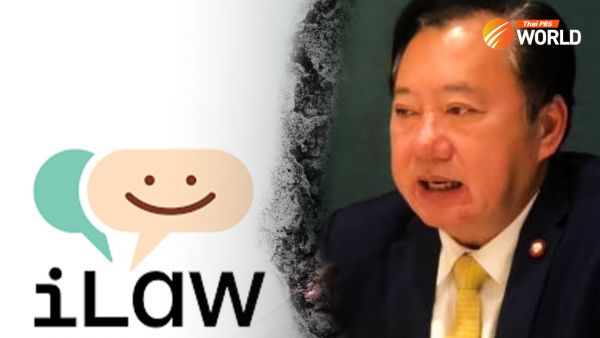Prapakorn’s personal journey of overcoming mental health challenges

“Crazy” is a term that some people in society might use to describe someone with a mental illness, said Prapakorn Winaisathaporn (Keng) who has suffered with schizophrenia for years.
“For me, it is seen as just a type of illness, similar to other conditions like diabetes or high blood pressure. When one is unwell, with proper treatment, recovery is possible,” she said, adding “I do not feel ashamed of it, even though there may be people talking behind my back.”
Reflecting back to 2011, Prapakorn experienced schizophrenia while pursuing her Ph.D. as a scholarship student in Kent, England. She believed her email was being hacked and felt she was being tracked via Skype and monitored through CCTV by the Thai government. These were symptoms of schizophrenia, characterized by delusions and hallucinations. Persons with schizophrenia often perceive things that others don’t, creating a surreal experience, akin to scenes from sci-fi movies. Normally kind, friendly, and good-natured, Prapakorn became moody, suspicious and withdrew due to the illness.
England has a robust support system and Prapakorn was treated with empathy. She received support from her professor and landlord. These are crucial factors that enabled her to complete her Ph.D. and become a lecturer at Mae Fah Luang University, despite later leaving the job.
Prapakorn’s supervisor at the University of Kent in the UK played a vital role in her academic success. When Prapakorn exhibited symptoms, her supervisor noticed the change, suggested she see a university psychotherapist and took appropriate action. Despite Prapakorn’s attempt to resign from her Ph.D. studies, the supervisor, understanding Prapakorn’s condition, contacted a psychiatrist on her behalf.
During a severe episode, Prapakorn was admitted to hospital after attempting to self-harm. Her landlord, sensing something was amiss, contacted the supervisor, who then reached out to the hospital. Prior to this, a psychiatrist and team had visited her residence twice.
Prapakorn’s landlord played a significant role in her recovery. Having a son with Autism, the landlord understood and treated Prapakorn with the same care as his own son. A bond formed between them and they frequently supported each other.
The hospital to which Prapakorn was admitted was a public facility, part of the UK’s National Health Service, with a positive ambiance, equipped with amenities like bathrooms, laundry machines and exercise facilities. The ambiance unexpectedly played a substantial role in influencing patients’ mood and thoughts.
After Prapakorn’s discharge, following a 28-day hospital stay, the University Vice Chancellor arranged a meeting with Prapakorn, her supervisor and a well-being advisor. She advised Prapakorn to seek academic guidance from her Ph.D. supervisor and mental health support from the well-being advisor. Prapakorn consulted the well-being advisor for one hour every two weeks. Additionally, National Health Service Staff from Kent visited her at the university every two weeks.
“My supervisor was kind and understood human nature. He had high empathy, and the well-being advisor was very professional,” Prapakorn said with admiration.
She admired England’s system and the humanity of its people, expressing a desire to see these principles implemented in Thailand. Thailand still lacks a system as robust as England’s, and not many people truly understand a mental illness like schizophrenia.
Prapakorn assumed the role of a scholarship lecturer at Mae Fah Luang University after completing her Ph.D. in England. Regrettably, just one year into her tenure, she found herself compelled to resign. This was disheartening, especially considering that Prapakorn had not taken any medication since her discharge from a mental health facility in the UK. Unfortunately, this lack of treatment allowed her delusions to escalate to a serious stage.
In an email to the university’s president, Prapakorn detailed the symptoms she was experiencing, expressed her desire to resign and requesting an examination of the scholarship sponsor contract. She inquired whether it was possible to be exempted from repaying her compensation due to resignation due to mental illness. Notably, she concluded the email by explicitly stating that it was not a formal resignation.
The president was aware that Prapakorn, if she resigned, would be obligated to pay a substantial amount. He also knew that Prapakorn was suffering from mental illness. Nevertheless, Mae Fah Luang accepted her resignation, based solely on her email, without any formal documentation. That email meant that she faced complex legal issues for the next nine years.
She was sued for 16 million baht in compensation by the Ministry of Higher Education, Science, Research, and Innovation and Mae Fah Luang University for failing to complete her ten years as a lecturer, as required under scholarship rules . Alongside the symptoms of mental illness, she also had to handle this matter. This made her feel hopeless.
“I was stressed out and severely depressed. I wanted to end my life to escape from its problems. I didn’t have the energy to do anything. I didn’t leave home and didn’t want to see anyone, but I resisted, continuing my life,” Prapakorn said.
After Prapakorn sought help from various people and organisations, activist Soombat Bunngam-anong, Director of the Mirror Foundation, reached out. This gave Prapakorn the opportunity to advocate for herself and for others with mental illnesses facing similar challenges on a news television program. Her appearance quickly went viral, thrusting her into the media spotlight. This marked a significant turning point in her journey.
A recent update indicates that, based on ‘humanitarian principles,’ she will be fully supported for exemption from paying the compensation. Dr. Pechdau Tohmeena, Advisor to the Minister of Higher Education, Science, Research, and Innovation, conveyed the minister’s order during a consultation meeting on December 25, 2023, at the ministry.
When asked about any additional support she needed, Prapakorn expressed a desire to have the paid money refunded and to receive compensation according to the labour law for leaving the lecturer job in the University when her schizophrenia got worse. The ministry will be responsible for further negotiations and finding ways to reintegrate her into government service.
At present Prapakorn has full-time employment as a researcher at the Fiscal Policy Research Institute Foundation. She expressed contentment with her new job during an interview with Thai PBS.
Prapakorn explained “I feel a sense of purpose. I have the chance to do a job I love. This has restored my confidence. My colleagues are supportive and empathetic.”
There are other cases, similar to Prapakorn’s, that have yet to be addressed. If people gain a better understanding of the illness and embrace empathy, based on ‘humanitarian principles,’ the likelihood of problems occurring would diminish.
By Neeranuch Kunakorn






